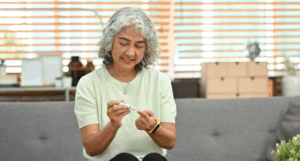Speaking to autistic adults to understand and improve their experience of breast cancer

Picture by SHVETS production
Autistic adults who have had breast cancer are invited to share their experiences of diagnosis and treatment as part of a new research project.
Breast Cancer Now has funded the three-year study by Dr Char Goodwin, Professor Manuela Barreto, and Professor Ginny Russell at the University of Exeter. Researchers will interview and survey autistic adults who have had breast cancer about their experiences from diagnosis to finishing hospital treatment, before offering guidance and recommendations to healthcare professionals based on the results.
Previous research has shown that autistic people have a worse prognosis and poorer experiences when it comes to cancer, but this study seeks to better understand which elements are unique to autistic people, what works, what doesn’t, and what solutions can be found.
Lead researcher Dr Char Goodwin from the University of Exeter is autistic and has lived experience of breast cancer. She said: “Hearing the words ‘you have cancer’ changes you forever. You are thrust into a world of appointments, procedures and treatment. This is tough for anyone, but for autistic people there are additional challenges that can make navigating the healthcare system particularly difficult. For example, hospitals are often noisy, overcrowded and with bright lighting, which can cause sensory overload. This can be challenging when a cancer diagnosis will require multiple hospital appointments.
“Often research in this area focuses on other people’s perspectives of what breast cancer diagnosis and treatment is like for autistic people. This study recognises the importance of hearing from autistic people themselves about their experiences. We know that the earlier breast cancer is diagnosed, the higher the chances are of successful treatment, but autistic people experience barriers in healthcare that can delay getting their diagnosis and starting treatment. It’s crucial we understand how autistic people experience breast cancer care, from their perspective, so that barriers can be removed or reduced.”
During the study, researchers will interview eight to 12 autistic people about their experiences of breast cancer diagnosis and treatment, and drawing on these results the team will then design and launch a nationwide online survey for autistic and non-autistic people who have been treated for breast cancer, to help them better understand the differences, challenges, and potential solutions. This research will ultimately form a set of guidelines for healthcare professionals to better support autistic patients, and advice for autistic people going through breast cancer diagnosis and treatment.
The voices of autistic people are central to this research, and an advisory group of autistic people who have had a breast cancer diagnosis will be formed to advise the researchers and help co-produce the interview and survey questions, along with the guidelines for health professionals and the autism community.
Dr Simon Vincent, Breast Cancer Now’s director of research, support and influencing, said: “Building an accurate and detailed picture of how autistic adults’ experience a breast cancer diagnosis and treatment is the first critical step towards improving their care. We’re delighted to be funding this research which will reveal key lessons for the healthcare system, and organisations such as Breast Cancer Now, so we can continue to best shape our support to meet the specific needs of autistic adults with breast cancer in the future.”
For further information or to participate in the research please visit – https://sites.exeter.ac.uk/aebcstudy/



